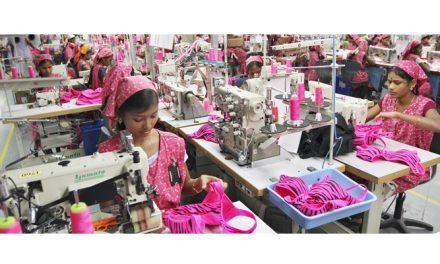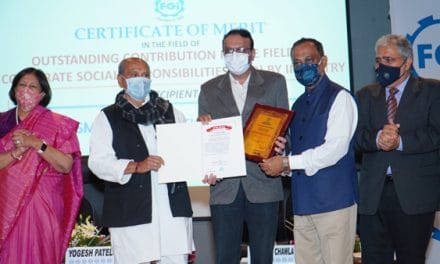 As the name suggests, Resilient Tirupur event held on the 8th of Feb 2020, is a testimony of the resilience of people of the knits capital of India. The event was 5th in the series that was started in 2012 bringing together the apparel industry players to get inspired, learn from leading experts and renew their commitment to achieving business growth and wellbeing of millions of people associated with this industry. The event was attended by over 1000 participants including factory owners, supply chain partners, senior professionals and students from textile/fashion institutes.
As the name suggests, Resilient Tirupur event held on the 8th of Feb 2020, is a testimony of the resilience of people of the knits capital of India. The event was 5th in the series that was started in 2012 bringing together the apparel industry players to get inspired, learn from leading experts and renew their commitment to achieving business growth and wellbeing of millions of people associated with this industry. The event was attended by over 1000 participants including factory owners, supply chain partners, senior professionals and students from textile/fashion institutes.
Speaking at the event Surinder Jain, Business Director of Wazir Advisors emphasised on the need to increase India’s share of exports to USA and EU. He said Chinese exporters have an advantage over India in terms of lower interest costs, lower overheads due to economies of scale and high efficiencies. He spoke of a Virtual Integration model practised by Chinese groups. He gave example of GTT group- where a core group of companies does all customer facing functions like marketing, merchandising, design – product development and approvals whereas the order execution functions like fabric trims and garment production are conducted by other factories located near by and profits get shared by the entire group. The group has a $4 bn turnover. Due to such reasons, China is competitive in spite of higher labour cost compared to India.
Dr. Rajesh Bheda, MD, Rajesh Bheda Consulting delivered his address on ‘Recipe for Resilience: Manufacturing Efficiency and Supply Chain Management’. The gripping presentation started with the story of Lord Hanuman, who had to be reminded of his powers by Jambwan, at the time of a need of flying to Lanka. Upon the reminder, Hunuman regained his powers and took the flight to Lanka and rest is known to all of us…. Dr. Bheda asserted that all of us have powers to do extraordinary things, but the Hanuman is us need to be invoked. With case studies, he demonstrated how the factories in Tirupur can and have improved productivity by 25 to 30 percent. He also shared cases of factories of leading international groups achieving benchmarks productivity of 75+ percent efficiency in Ethiopia with the application of best practices, against most factories struggling with low productivity there.
Emphasising the need for creating Agile supply chains to reduce lead-times and on-time delivery, he stated that factories in Tirupur must target 45 day lead time than continuing with 75 or 60 days lead time. He asked how many factories in Tirupur are capable of virtual prototyping. Which is the need of the hour for speed in the fashion business? Speaking about the Priority Management System based on Theory of Constraints of Dr. Eliyahu Goldratt, he demonstrated how factories can ensure synchronisation between fabric as well as trim sourcing and production to ensure on-time delivery in much shorter lead time. The presented case study showed how, a leading Tirupur based group was able reduce lead time by 30 percent, reduce working capital needs by over 20 percent and increase the sales turnover by 40 percent with same resources, by application of Priority Management System for synchronising sourcing and Lean management principles in manufacturing.
In his passionate address, he urged the industry colleagues to work on developing young leaders in the organisations as well as industry associations. He further asked how can we dream of being a dominant player in international fashion business without presence of women in leadership role in organisations and associations.
He opined that the factory owners are walking around with a hole in their pocket and are losing money on various accounts like Cost of Poor Quality, delayed shipments, low efficiency etc. Quoting his buyer friend, he said that the large exporters in Tirupur have excellent credentials in terms of sustainability, product capability and acceptable quality. Smaller companies need to improve but, none of them can remain in basic products. The factories must develop capabilities to deliver high value fashion products of small quantity and shorter lead time so that, they are able to snatch the orders from the Dragon’s mouth.
Subhash Dhananjayan, Manager Director of Sting Sourcing and Production -India and South Asia while speaking about ‘Shorter deliveries and Smart Marketing,’ emphasised on speed to the market. He explained the benefits of shorter lead-time for manufacturers such as, better cash cycle, lower overheads and higher turnover leading to higher profitability. He also emphasised on the role of Product development and citing the example of several of his suppliers who are able to book, 65 percent of orders based on their own design developments and remaining 35 percent orders based on customer Tech Packs.
Other speakers included Sabhari Girish who spoke about importance of original design development, Prashant Palsule Regional Head South India Polyester from Reliance talked about the possibilities using Recron fibre for product diversification specially in performance apparel. M Natarajan VP Sales and Marketing – South from Birla Cellulose spoke about utilising viscose yarn for promoting sustainability.
While speaking at the event, Raja Shanmugham, President TEA explained how the business in Tirupur has grown three fold in last 6 years with the hard work of the entrepreneurs and all the stakeholders. After worrisome news coming from Tirupur after the difficulties of GST implementation, he was happy to see the positive developments with business flowing in Tirupur. He said, instead of spreading negativity, it was time to look at the opportunities to improve as explained by Dr. Rajesh Bheda in terms of efficiency and supply chain management. “This is the time for the realisation. If we don’t realise, we will lose all the opportunities.” Talking about a buyer’s feedback Shanmugham stated that workers in Tirupur are far superior, but the overall control of raw material sourcing and coordination between the supply chain partners in Tirupur is very low. In Bangladesh, leading factories ensure that all inputs are in the factory before starting production and this helps in achieving high productivity. He also emphasised on the need for developing mid management.
The audience also had an opportunity to listen to inspiring address of Pari, Former Inspector General Police, Tamil Nadu. In his passionate address, he emphasised on the need for developing young leaders. He further added that in our nation, where 65 percent of the people are young, there is an opportunity to utilise their enthusiasm and energy to develop the country. Facing adversities should lead to building confidence to overcome hurdles in business and achieve success. Self-confidence is crucial, not only for the development of the business, but also for the development of individuals, he said.
“We should develop young women leaders to take the business into next level, quoting the example of Bharathiar and his speeches on the role of women. While we are targeting one lakh crores in 2022, we should keep in mind the conservation of the naturals resources.” He spoke of adopting the latest technologies and systems in factories. He further added that only factories that operates on the strength of systems, without the daily involvement of the Owner / Managing Director, shall succeed in the long run.
The event was organised by Tirupur Exporters Association and NIFT TEA Institute in Association with Sripuram Trust and TTPK and sponsored by Reliance and Birla Cellulose.






















